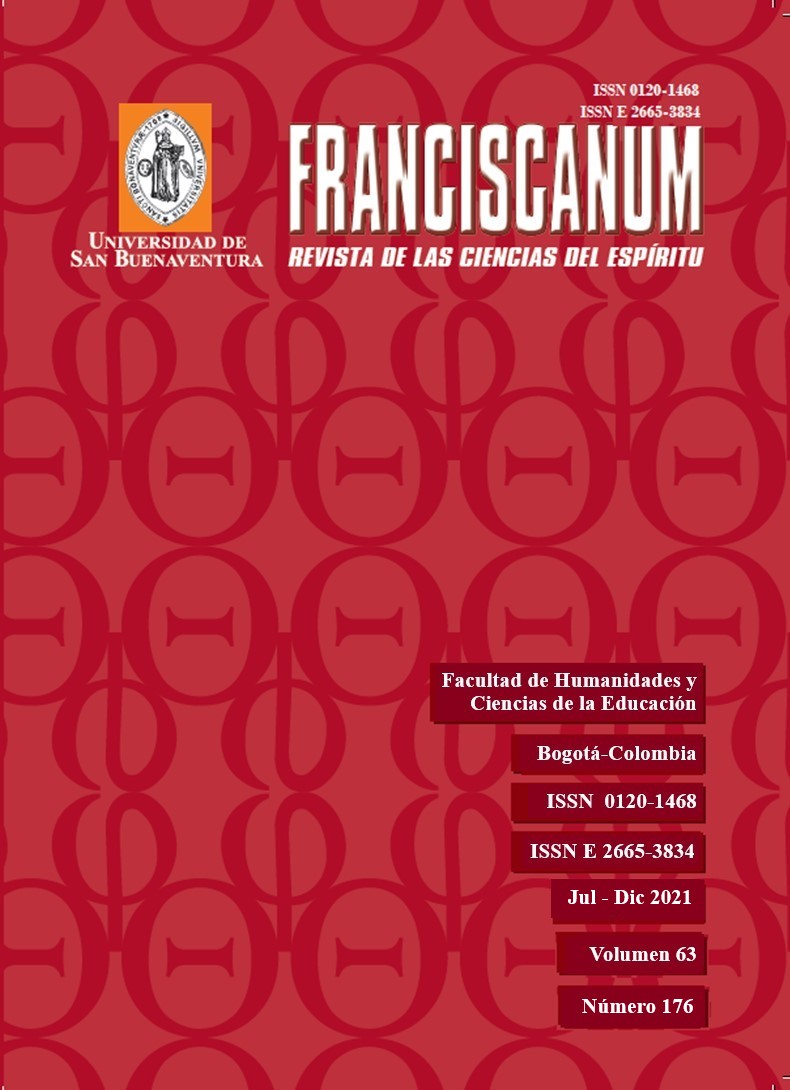This journal provides immediate open access to its content, based on the principle that giving the public free access to research helps a greater global exchange of knowledge.
Therefore, the Creative Commons 4.0 Attribution Attribution - Equal Share (by-sa) License is accepted: The commercial use of the work and the possible derived works is permitted, the distribution of which must be done with a license equal to that regulates the original work.
http://creativecommons.org/licenses/by-sa/4.0/
Along these same lines and in line with the Open Access policy, it is clarified that the authors maintain their rights to articles, without restrictions and, in the same way, they maintain their publication rights, without restrictions. They are only asked to reference the number of the Franciscanum magazine where the article initially appeared.
Abstract
The question of language is decisive through the impressive Llull’s work, and it is so also when he offers an interreligious disputatio and a political allegorization. All this accent is noted in the Llibre del gentil e dels tres savis and in the Llibre de les bèsties, with rhetorically different but effective resources. This paper pretends to show the importance of these works to achieve, by means of diverse linguistic styles, the everlasting purpose of Llull: to argue the Christian truth and to convert the people that not yet accept that.
References
Abellán, Joaquín. Conceptos políticos fundamentales. Madrid: Alianza, 2012.
Batalla, Josep. «L’art lul·liana, com a teología filosòfica». Revista de lenguas y literaturas catalana, gallega y vasca 15 (2010): 321-344.
Badia, Lola. Teoria y pràctica de la literatura en Ramon Llull. Barcelona: Quaderns Crema, 1991.
Badia, Lola. «Nova retòrica i pràctica d’escriptura en Ramon Llull». Quaderns d’Italià 18 (2013): 79-91.
Barenstein, Julián. Homo pacificator. El hombre y la paz en Ramon Llull y Giovanni Pico della Mirandola. Buenos Aires: Universidad de Buenos Aires, Tesis de licenciatura, Facultad de Filosofía y Letras, 2010.
Berlin, Isaiah. «El puercoespín y el zorro. Ensayo sobre la visión de la historia en Tolstói». En El estudio adecuado de la humanidad. Traducido por J. J. Utrilla, 347-414. México: FCE/Turner, 2009.
Bloom, Harold. Ramon Llull and catalan tradition. Barcelona: Institut Ramon Llull, 2006.
Bonner, Anthony. «Qui té por de Ramon Llull?». Studia Lulliana 54 (2014): 87-99.
Bonner, Anthony. «La disputa interreligiosa, la solución ingeniosa de Ramon Llull». Quaderns de la Mediterrània: Ramon Llull y el Islam, el inicio del diálogo 9 (2008): 362-368.
Brague, Rémi. Au moyen du Moyen Âge. Philosophies médiévales en chrétienté, judaïsme et islam. Paris: Champs essais, 2006.
Butiñá, Julia. «Sobre el escandaloso “Llibre de les bèsties” de Ramón Llull y su audiencia». Espacio, Tiempo y Forma, Serie III, Historia Medieval 17 (2004): 79-94.
Butiñá, Julia. «El Libre de les bèsties de Llull y el comportamiento político», En El pensamiento político en la Edad Media. Coordinado por Pedro Roche, 321-332. Madrid: Editorial Centro de Estudios Ramón Areces, 2010.
Carreras i Artau, Tomàs y Carreras i Artau, Joaquim. Història de la filosofía española. Filosofia cristiana del segle XIII al XV Vol. 1: El escolasticismo popular. Ramon Lull (Raimundo Lulio). Barcelona: Institut d’estudis catalans/Diputació de Girona, 2001.
Classen, Albrecht. Toleration and Tolerance in Medieval and Early Modern European Literature. N. York/London: Routledge, 2018.
Colomer, Eusebi. El pensament als països catalans durant l’edad mitjana i el renaixement. Barcelona: Institut d’estudis catalans, 1997.
Cruz Hernández, Miguel. El pensamiento de Ramon Llull. Madrid: Castalia, 1977.
Domínguez, Fernando. «Editorial». Scintilla. Revista de Filosofia e Mística Medieval 10/1 (2013): 7-16.
Domínguez, Fernando. «Dios, el mundo y el hombre según Ramon Llull». Revista de lenguas y literaturas catalana, gallega y vasca 20 (2015): 245-258.
Domínguez, Fernando y Uscatescu, Jorge. «Ramon Llull». En Grundriss der Geschichte der Philosophie. Editado por A. Brungs et alii. Vol. 4 t. 2: Die Philosophie des Mittelalters 13. Jahrhundert 1051-1087 y 1098-1107. Schwabe: Basel, 2017.
Flasch, Kurt. Das philosophische Denken im Mittelalter. Von Augustin zu Machiavelli. Stuttgart: Reclam, 2006.
Gilson, Étienne. La filosofía en la Edad Media. Desde los orígenes patrísticos hasta el fin del siglo XIV. Traducido por A. Pacios y S. Caballero. Madrid: Gredos, 1999.
Gomila, Antoni. «El “Llibre de l’affatus” en Ramon Lull: la idea de un sexto sentido». Revista de historia de la psicología 2-3, Vol. 13 (1992): 375-380.
Johnston, Mark. «Affatus: Natural Science as Moral Theology». Estudios Lulianos 30 (1990): 3-30 y 139-150.
Llull, Ramon. Llibre del gentil e dels tres savis, Nova Edició de les Obres de Ramon Llull Vol. 2. Editado por A. Bonner. Palma de Mallorca: Patronat Ramon Llull, 2001.
Llull, Ramon. Libro del gentil y los tres sabios. Traducido por M. Conde. Madrid: BAC, 2007.
Llull, Ramon. Félix o Libro de maravillas. Traducido por M. Marco et alii. Madrid: BAC, 2016.
Llull, Ramon. «Vita coetanea». En Obra escogida. Traducido por P. Gimferrer. 1-22. Madrid: Alfaguara, 1981.
Llull, Ramon. «Arte breve». En Arte breve. Vida coetánea. Traducido por J. Barenstein. 213-379. B. Aires: Ediciones Winograd, 2016.
López Alcalde, Celia. «La literatura proverbial de Ramon Llull». Scintilla. Revista de Filosofia e Mística Medieval 1, Vol. 10 (2013): 63-78.
Maquiavelo, Nicolás. El Príncipe. Traducido por I. Costa. B. Aires: Colihue, 2012.
Mayer, Annemarie. Drei Religionen –ein Gott? Ramon Lulls interreligiöse Diskussion der Eigenschaften Gottes. Freiburg-Basel-Wien: Herder, 2008.
Pocock, John. El momento maquiavélico. El pensamiento político florentino y la tradición republicana atlántica. Traducido por M. Vázquez y E. García. Madrid: Tecnos, 2008.
Priani, Ernesto. «Ramon Llull (4.1. The Sixth Sense)». En Stanford Encyclopedia of Philosophy. Consultada en febrero 10, 2017, https://plato.stanford.edu/entries/llull/.
Ruiz, Josep. «De guineus, lleons, llops i pastors: domini i govern en el pensament polític de Llull». Quaderns d’Italià 18 (2013): 157-178.
Tusquets, Joan. «El lenguaje, como argumento, en la apologética de Ramon Llull». Estudios lulianos 28 (1988): 169-210.
Vega, Amador. Ramon Llull y el secreto de la vida. Barcelona: Siruela, 2002.
Xirau, Joaquín. «Vida y obra de Ramón Llull. Filosofía y mística (1946)». En Obras completas Vol. 2. 215-349. Barcelona: Anthropos, 1999.

 Perfil Google Scholar
Perfil Google Scholar


















